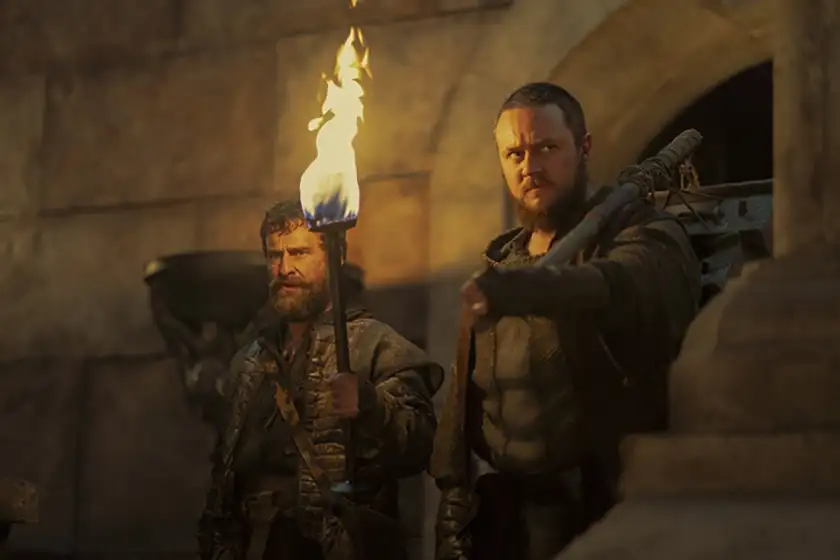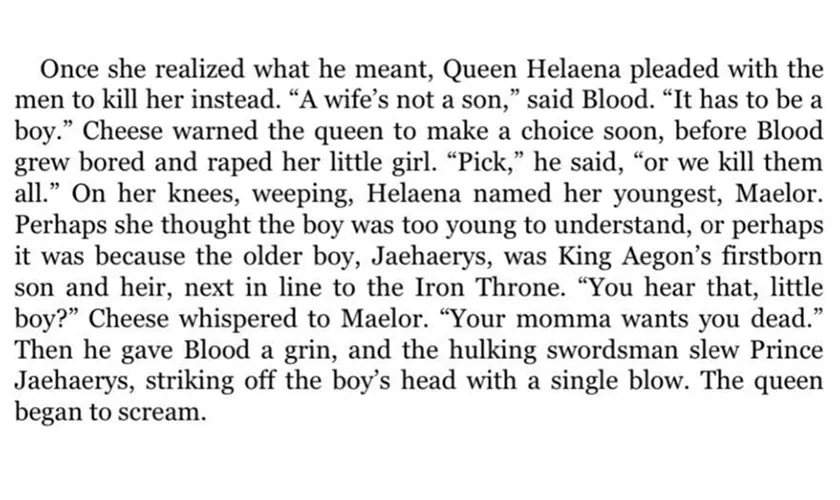House of the Dragon season 2 presents Helaena Targaryen with a choice that differs from its source material, and here’s why it is complex and a good change from the book.
As is tradition with the Game of Thrones universe, the season 2 premiere of House of the Dragon has given viewers a violent series of events to debate. In the season’s first episode, “A Son for a Son,” a pair of assassins are paid to murder a member of the royal family, resulting in a mother sentencing her child to death. The portrayal of how this plot unfolds has sparked controversy with readers of George R.R. Martin’s “Fire & Blood,” who argue the show didn’t fully commit to the brutal catastrophe depicted on the page. Today, I’ll tell you why Helaena’s choice is far more complex than audiences give it credit for, and deserves to be recognized as a good change from the book.
Daughters and Sons, Who Matters Most
One key point House of the Dragon season 1 tackles is how cruel and flawed the hierarchical political system is, especially to women rising to power in these times. A daughter can’t come before a son because the law and precedent forbid it. Men are more valuable simply due to traditions and seeing themselves as better suited to rule. So, as a consequence, at least in the world of Westeros, the ladies of the Seven Kingdoms are reduced to having the sole purpose of birthing children.
Hence, when Rhaenyra Targaryen (Emma D’Arcy, The Talent), daughter of King Viserys I (Paddy Considine, Wolf), is named her father’s heir even after bearing a son with his second wife and childhood friend of Rhaenyra, Alicent Hightower (Olivia Cooke, Slow Horses), the realm slowly begins to take sides in support of one offspring over the other. Alicent and Rhaenyra’s lives couldn’t be more different. Viserys shows favoritism towards her eldest child at the expense of his kids with Alicent. He constantly shows support for her claim to the throne despite accurate accusations questioning the parentage of her first three sons. Rhaenyra is, by all means, a daddy’s girl. She was loved and respected.
Meanwhile, Alicent’s situation is much direr. When the King’s wife dies in childbirth, Otto Hightower (Rhys Ifans, Nyad), Alicent’s father and Hand of the King, immediately sends his daughter to seduce Viserys. He sees her as no more than a tool to increase his family’s status in court and gain power, a common practice in Westeros. As a result, Alicent lives in utter misery, never getting to explore her interests and what makes her happy. Her sole goal is to produce heirs for the King, who will never be as beloved as his eldest daughter.
It’s important to have discussed the unfair nature of this world’s laws and traditions before diving into Helaena’s (Phia Saban, The Last Kingdom) choice and why it is complex because this thematic throughline, at its core, is what the events of House of the Dragon are all about. A family tears itself apart, leading them to kill their own, and the realm is dragged into this conflict because men can’t accept seeing a daughter ascend the Iron Throne over a son. Characters grow bitter towards one another due to their actions and the rules they’re supposed to obey. All this brings us to House of the Dragon season 2, episode 1, “A Son for a Son.”

Blood & Cheese in House of the Dragon: Book vs. Show
Similarly to the show, in George R.R. Martin’s “Fire & Blood,” Aemond Targaryen (Ewan Mitchell, Saltburn), Alicent’s second son, kills his nephew Lucerys Velaryon (Elliot Grihault) with his dragon Vhagar, prompting Rhaenyra’s uncle/husband Daemon (Matt Smith, The Crown) to plot their revenge against the Greens. Daemon hires a member of the City Watch and a ratcatcher, known as Blood (Sam C. Wilson, Dodger) and Cheese (Mark Stobbart, The Long Shadow), to break into the Red Keep and murder one of King Aegon II’s (Tom Glynn-Carney, Tolkien) sons as payback – who at this point has usurped his sister’s throne with the help of his family.
Where the book and TV series differ is in execution. Blood and Cheese murder a member of the royal family, but whereas House of the Dragon presents Rhaenyra specifically asking for Aemond’s head, “Fire & Blood” sees Daemon directly targeting one of Aegon’s sons, at least that’s the implication. In the show, the latter is more of a plan b if things go wrong and if Blood and Cheese are not capable of finding Aemond. The most crucial change, though, is how the scheme unfolds.
In the book, Aegon and Helaena have three children: the twins Jaehaerys and Jaehaera and a young boy named Maelor. Jaehaerys is next in line to inherit the throne after Aegon if his war against his sister is successful. So, he’s perceived to be the most important of the three kids. When the two mercenaries make their way to the Queen’s chambers, Helaena must decide which son gets to die.

In House of the Dragon season 2, there is no third child. Maelor does not exist, most likely because, other than the Blood and Cheese scheme, he doesn’t add much to the narrative. Instead, showrunner Ryan Condal and his staff of writers decide to make the moment one of choosing to sacrifice a daughter or a son, something the series has been exploring since its first season. We don’t get the “your momma wants you dead” moment. In exchange, we gain a character decision that furthers the dilemma that women’s lives are just as valuable as men’s. Helaena’s choice to protect Jaehaera over Jaehaerys (the male heir), dooming her son to a horrendous death, gives her agency and instantly makes it as tragic as “Fire & Blood” in a different, twisted way.
Why Helaena’s Choice is Complex, in Theme, and a Good Change from the Book
In her shoes, Helaena’s family would have never done for her as she did with Jaehaera. Helaena is deemed the odd kid of the bunch for having a visceral reaction to unwanted touch and her interest in insects and prophetic dreams. Despite being a brat, Aegon was always the most valued of Alicent’s children growing up for being the firstborn son. That’s how they were treating Jaehaerys already, too. They show favoritism to him for being a male and next in line. From the few moments we see of her, Jaehaera is just there with no one paying attention to her other than her mother and maids. It’s easy to assume that had Alicent been in Helaena’s shoes or anyone else in their family, they would have given Jaehaera up to Blood and Cheese to save the boy.

Women’s right to choose is irrelevant in this world when they can play a role in others’ grasp of power. Alicent is proof of that. In his ambition, Otto sold her to Viserys. Then, Alicent does the same with Helaena by refusing Rhaenyra’s peace proposal to marry Helaena to her son Jacaerys (Harry Collett, Dolittle) – which would have united the divided family and given each side a win as both children would have grown to be King and Queen– only to use Helaena to strengthen Aegon’s claim to the throne.
The writing is on point. Ryan Condal and his writers continue to grapple with the damaging practice of putting more value on men than women. It’s thematically rich to have Helaena break the cycle, in a sense, and choose a daughter over a son, whether it is a conscious choice or out of survival instinct. An argument could be made that Helaena did try to trick the assassins by making them think the girl was the boy as a result of her pointing to Jaehaerys, but that isn’t the framing I am getting from the writing, execution, and themes of the series. It’s clear she knew she couldn’t lie to the armed men threatening her, so she chose her daughter.
Phia Saban deserves her flowers. The sheer horror in her eyes throughout the sequence is as mesmerizing as it is nightmarish to witness. Even Helaena’s instinct to run to her mother’s chambers, Jaehaera in her arms, is poignant. Here, you have that same awkward little girl from season 1 trapped in a woman’s body, running to her mother for safety. When she finally speaks up after the traumatic event, all she can say is, “They killed the boy.” Avoiding addressing him as her son almost out of fear that if she acknowledged what happened, it would mean that it was real and not one more of her prophetic dreams. All of this is expressed through Saban’s eyes.
Fans of “Fire & Blood” have taken to social media to call the sequence underwhelming, claiming that the show didn’t go far enough. Others have found an issue with Helaena’s reaction or lack of. They state that no mother would simply give away one of her own to assassins. In any other context, I’d agree with these statements. I’ve seen what poor adaptations can do to character and narrative arcs. Hell, we’ve seen it happen in the Game of Thrones universe. But I don’t think this is an example of that. Condal takes a complicated story beat and asks how he can strengthen the overall thesis of his show rather than do shock value for shock’s sake. I see Helaena’s choice as messy and complex, not a sign of a lack of commitment to Martin’s brutal world.
Season 2 Episode 1 of House of the Dragon is now available to stream on Max. Read our review and recap of the episode below!

